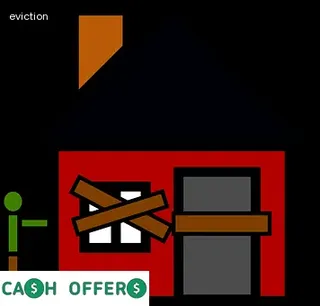In Nebraska, the eviction process can take anywhere from a few days to several weeks depending on the situation. It is important for tenants to understand their rights and laws in order to properly protect themselves during an eviction.
The first step of the eviction process is receiving notice that your landlord wishes to evict you. Depending on the cause of the eviction, this notice may vary in length from 3 days to 2 weeks.
After notice has been delivered, there are three specific steps that must be taken by landlords before legally evicting a tenant: filing an eviction complaint with the county court, obtaining a summons for you to appear in court, and providing you with legal service of these documents. You have certain rights as a tenant throughout all of these steps including the right to respond to any accusations made by your landlord in court and present any valid defenses that you may have such as paying rent before the hearing or establishing that your landlord did not follow proper protocol in issuing notice.
Understanding these rights and laws can ensure that both parties are treated fairly during the process.

When sending a Notice to Comply, it is essential to include specific information that will both inform the tenant of their rights and set forth the steps necessary to avoid eviction.
This notice should include the full name of the tenant, the address where they are living, the exact nature of the alleged violation, a timeline for compliance with any demands, and an explanation of their right to dispute any claims before an eviction can occur.
The notice should also detail what happens if they fail to comply and provide a clear path for avoiding eviction.
It is important to ensure that all relevant laws regarding Nebraska evictions are followed throughout this process in order to protect both tenant and landlord rights.
Serving the tenant is a critical step in the Nebraska eviction process. To initiate an eviction, the landlord must give written notice to the tenant outlining the terms of their lease violation and providing an opportunity to ‘cure’ or fix the problem.
If a tenant does not cure the breach or vacate voluntarily, a landlord may then file an eviction petition in court. The tenant will be served with both copies of the complaint and notice of hearing.
It is important for tenants to understand their rights during this process so they can take necessary steps to protect themsleves. In some cases, tenants can raise defenses such as failure to provide habitable living conditions or retaliatory eviction by landlords.
Additionally, it is important for tenants to know how long they have before they need to appear in court, which varies based on state laws.

It is important to know the proper steps to initiate an eviction process in Nebraska. The first step is for the landlord to file a complaint with their local court.
The complaint must include detailed information about the tenant, such as their full name, address and rental agreement information, as well as a statement of the cause of action or grounds for eviction. Once this complaint is filed, it will be served on the tenant by a licensed process server.
The tenant has a certain number of days to respond and can do so by submitting an answer or counterclaim alleging any legal defenses they may have against eviction. At that point, the court will set a hearing date and both parties will present their case before a judge who will issue a final judgment.
In Nebraska, the most common reasons for eviction stem from tenant violations of their lease. This includes a failure to pay rent on time, having unauthorized occupants in the rental unit, causing damage to the property, or engaging in illegal activity.
Tenants may also be evicted if they breach other obligations under the lease agreement such as noise violations or keeping pets without permission. Landlords may also seek an eviction if a tenant is found to be creating an unsafe living environment.
Regardless of the reason for eviction, it is important tenants understand their rights and legal obligations before being served with an eviction notice in Nebraska.

When asking for possession of a property in the process of eviction in Nebraska, it is important to understand your rights, defenses and laws. A landlord must provide proper notification before filing an eviction lawsuit and filing a summons with the court.
These notices must be served by mail or delivered in person to the tenant. The tenant has the right to respond to the notice and can choose to file an answer within three days after receiving it.
If the tenant does not answer, the landlord may request a default judgment from the court which could result in immediate possession of the property. It is important for tenants to be aware that they have certain defenses when facing an eviction suit such as paying all rent due or offering evidence that repairs were promised but never done.
Additionally, tenants cannot be evicted based on discrimination. The length of time for an eviction proceeding varies depending on how quickly both parties can come to an agreement or how long it takes for a judgment from the court.
It is illegal for landlords to evict tenants without going through the proper court proceedings. Any attempt to do so can result in serious penalties, including fines and even criminal charges.
It is important that tenants understand their rights and the laws covering eviction in Nebraska. If a landlord attempts an illegal eviction, tenants should document all communication with the landlord and contact local authorities right away.
Tenants should also be aware of any potential defenses they may have against the eviction, such as lack of proper notice or failure of the landlord to make necessary repairs. Those who are facing eviction should seek legal advice from an experienced attorney who can help them understand their rights, ensure they are protected, and guide them through the entire process.

Once an eviction order is issued, the tenant is legally required to move out of the rental property. If they do not voluntarily leave, the landlord must take measures to secure possession of the property.
To do this, they may hire a constable or sheriff to serve a Writ of Restitution and remove the tenant from the premises. Typically, it takes approximately one week for the court clerk to issue a Writ of Possession after an eviction order is granted.
The constable or sheriff then has up to five days to serve the writ and complete their duties. While this process can be time-consuming, it's important for tenants to understand their rights and defenses during an eviction in Nebraska so that they are protected throughout the entire process.
The Nebraska eviction process can take anywhere from a few days to a few months depending on the circumstances. Landlords must give tenants proper notice before filing an eviction lawsuit in court, and this can be either three or five days depending on whether they are being evicted for failure to pay rent or for some other reason.
Once the suit is filed, the tenant has seven days to respond in writing with their defenses and arguments. After that, if no agreement is reached between the landlord and tenant, a hearing will be held where both sides will present their case before a judge.
Depending on how backlogged the court system is, it can take anywhere from one week to several weeks for a decision to be handed down by the judge. If the tenant loses the case, they then have up to four days after judgement is issued to vacate the premises.
Tenants should make sure that they understand their rights and laws when facing an eviction so that they can properly defend themselves in court and avoid unnecessary delays in the process.

When facing an eviction process in Nebraska, it is important to understand what supporting evidence may be required to present your case. Generally, the court will require proof of service of the notice to vacate, a copy of the lease or rental agreement, and any other documents regarding rent payments or any other agreements between you and your landlord.
Other documents that could be necessary include proof of inability to pay rent due to unemployment or medical emergency, proof of damages caused by the landlord, notices from government agencies informing the landlord of their duties, or documents proving attempts at negotiation with your landlord for alternative resolutions. Any evidence presented should be organized and relevant to the case.
Additionally, it is important for tenants to remain aware of their rights under state law as well as any defenses they may have against eviction proceedings.
When you're looking to build your portfolio, it can be helpful to get resources to help. Fortunately, there are a variety of free downloads available that can provide information on the Nebraska eviction process, understanding your rights and defenses, and familiarizing yourself with applicable laws.
Whether you're a landlord or tenant, it's beneficial to have access to up-to-date information about tenancy laws and rental regulations. From legal documents to sample forms and checklists, these free downloads offer an array of resources for both landlords and tenants in Nebraska.
Additionally, there are many online portals providing step-by-step instructions on how long the eviction process takes and what rights you may have as a tenant or landlord. Understanding the legalities surrounding an eviction can make all the difference when it comes to navigating this sometimes overwhelming situation.
With these resources at your disposal, you'll be well equipped with the tools needed to maximize your chances of success.

DoorLoop is an online platform that saves landlords time and money during the Nebraska eviction process. Its intuitive dashboard provides a clear overview of legal requirements, enabling landlords to file evictions quickly and efficiently.
The platform also helps landlords protect their rights by allowing them to easily access up-to-date information on Nebraska's regulations governing tenant evictions. Additionally, DoorLoop offers a range of tools and resources so that landlords can understand the ins and outs of eviction law in the state.
This includes information on tenant defenses, deadlines, and other important considerations that can affect how long the eviction process takes. With its comprehensive online solutions, DoorLoop ensures that landlords have access to all of the information they need to effectively navigate Nebraska's eviction laws.
Renting and leasing property can be a complicated process, especially in the state of Nebraska. If you are facing eviction, it’s important to understand your rights and laws under Nebraska law.
Knowing how long the eviction process takes is also essential for navigating the situation. Requesting a demo from an experienced lawyer or attorney can help you get started with understanding the eviction process and your rights as a tenant in Nebraska.
With a demo, you can gain insight into the legal framework governing evictions, as well as any potential defenses that may apply to your case. Don't delay - request your demo today to get the answers you need and understand more about the Nebraska eviction process.

When signing up for any kind of rental agreement in Nebraska, it is important to understand the terms and conditions you are agreeing to. Many people do not take the time to read the fine print and can find themselves in a difficult situation if they don’t know their rights or the laws in place.
Depending on the specifics of your lease, there may be specific rules regarding how much notice must be provided before an eviction can happen, as well as regulations around security deposits and tenant liability. It is therefore essential that you pay close attention to what is outlined in your contract so that you are aware of your rights and responsibilities during the course of your tenancy.
Knowing this information can help make sure that if an eviction process does take place, it is handled swiftly and according to the law.
In Nebraska, the grounds for eviction are very specific and outlined in the state’s landlord-tenant laws. Tenants may be evicted if they are behind on rent payments or if they have violated the terms of their lease agreement.
Landlords may also evict a tenant if they have caused property damage, caused a nuisance on the premises, or violated any local ordinances. These are all considered valid legal grounds for eviction in Nebraska.
If a tenant is served with an eviction notice, they must respond to it in writing within fourteen days of receiving it. Failing to do so can result in a default judgment being entered against them and potentially an expedited eviction process.
It is important that tenants understand their rights and defenses under the law; consulting with a lawyer can help them navigate this complex process.

As a landlord in Nebraska, it is important to understand the legal requirements for evicting a tenant and making sure that the eviction process is done properly. It's important to be aware of the applicable state and local laws and regulations, as well as any applicable notice requirements.
One way to ensure that you are compliant with all applicable eviction laws is to put your portfolio on DoorLoop, an online platform designed specifically for landlords. With DoorLoop, you can easily and conveniently manage all of your rental listings in one place and ensure that you always stay up-to-date on any changes or updates in regards to eviction laws.
Additionally, DoorLoop also makes it easy to track tenant payments so that you can stay informed about whether you are owed any past due rent or not. By taking advantage of this platform, landlords can rest assured knowing that they are adhering to all legal requirements for evicting tenants in Nebraska in order to prevent illegal evictions from occurring.
Evicting a tenant in Nebraska can be a long and complicated process. It is important to understand the laws, your rights, and available defenses before starting the eviction process in order to ensure that it is done correctly and efficiently.
In general, an eviction in Nebraska may take anywhere from three weeks to two months or more depending on various factors such as whether or not the tenant contests the eviction, how quickly the court processes paperwork and hearings, if there are any appeals filed, etc. First, a landlord must serve the tenant with a written notice of termination or “Notice to Quit”.
This notice must be served either personally or by posting it at the premises or near an entrance. After this, if the tenant does not move out within three days (or other specified time period) then the landlord can file an eviction complaint with their local court.
The clerk of court will then give legal notice to both parties of an initial hearing date which typically takes place within 15-20 days after filing for eviction. If no settlement is reached during this hearing then another date will be set for trial where each party will have a chance to present their case before a judge who makes a final ruling on whether or not to grant an eviction order.
If granted, enforcement usually occurs in 7-10 days however appeals can extend this timeframe significantly as well as add additional court costs for both parties. It is important that landlords know their rights and obligations when evicting tenants in Nebraska so they don't end up unnecessarily prolonging the process or worse, getting into legal trouble for violating state laws regarding evictions.

In Nebraska, eviction is the legal process of removing a tenant from a rental property due to violation of the lease agreement or for non-payment of rent. The laws governing eviction in Nebraska are outlined in the Nebraska Residential Landlord and Tenant Act.
The first step in the eviction process is when the landlord serves the tenant with a written Notice to Quit. This notice informs the tenant that they have a certain number of days to either pay rent or move out before legal action is taken.
If payment isn't made or possession isn't voluntarily surrendered within that time frame, then the landlord can file an Eviction Complaint with their local court. The court will then serve an Order to Vacate on the tenant, which sets a hearing date and gives them another opportunity to pay or vacate the premises.
If neither happens, then law enforcement may be contacted to remove the tenant forcibly from the premises. The entire process typically takes between two and four weeks depending on how quickly it moves through court proceedings and how long it takes for law enforcement to respond.
In Nebraska, a landlord must provide a tenant with written notice of the eviction at least thirty days before the tenant must move out. This is known as a Notice to Quit.
The amount of notice for a tenant to vacate depends on the reasons for the eviction and the type of tenancy. For example, tenants who have committed lease violations or caused damage to the rental property must be given at least fourteen days’ notice.
Tenants who are on month-to-month leases may be asked to leave with thirty days’ written notice from their landlord. In addition, landlords are prohibited from evicting tenants without cause in Nebraska, which means that they must have valid legal grounds for doing so before issuing an eviction notice.
It's important for tenants to understand their rights and defenses when facing an eviction in order to properly navigate the process and ensure their legal protections are upheld throughout.
In Nebraska, an eviction can stay on your record for up to seven years. This means that landlords and other housing providers will be able to see the eviction when reviewing rental applications.
However, there are certain forms of expungement available if the tenant has met certain criteria. For example, the landlord may have filed the eviction in bad faith or there may be a legal defense to the eviction that was successful.
In addition, tenants may be able to negotiate with their landlord to have the eviction removed from their record by entering into an agreement with them. Ultimately it is important for tenants to understand their rights and defenses under Nebraska law so that they can effectively advocate for themselves during an eviction process.